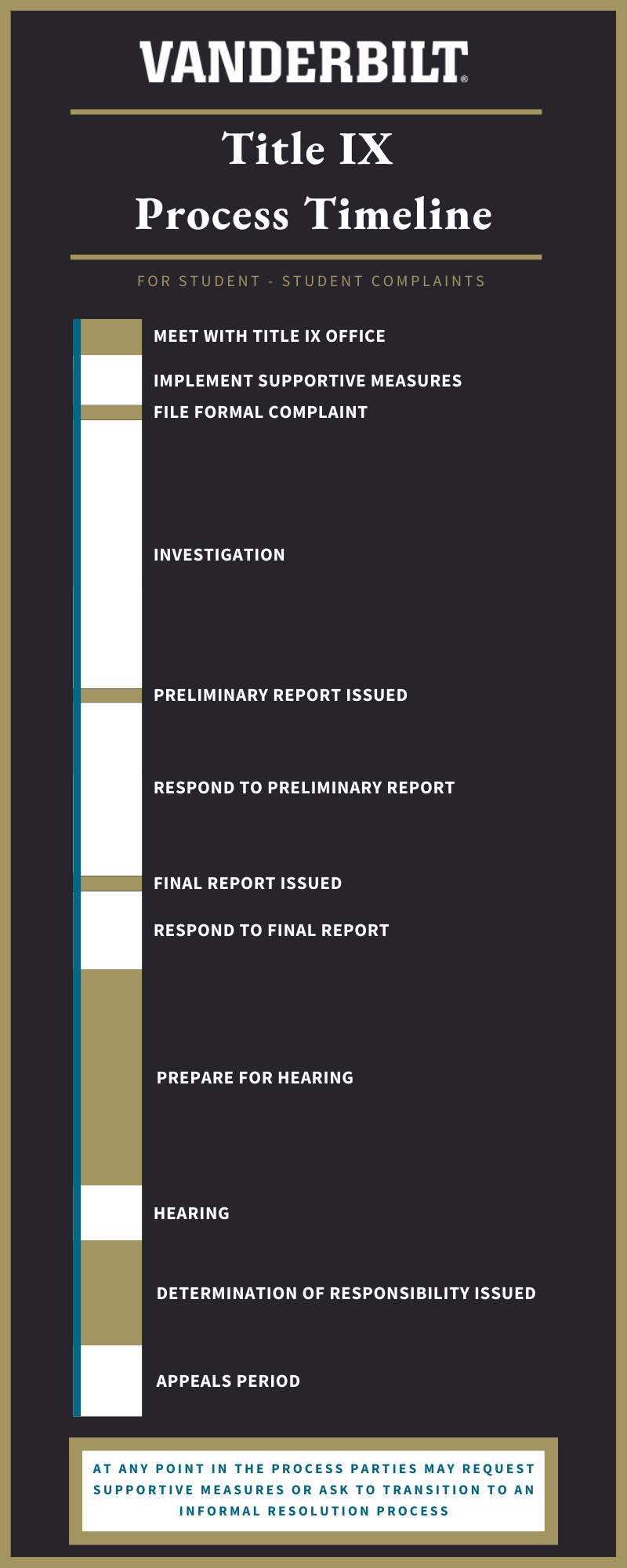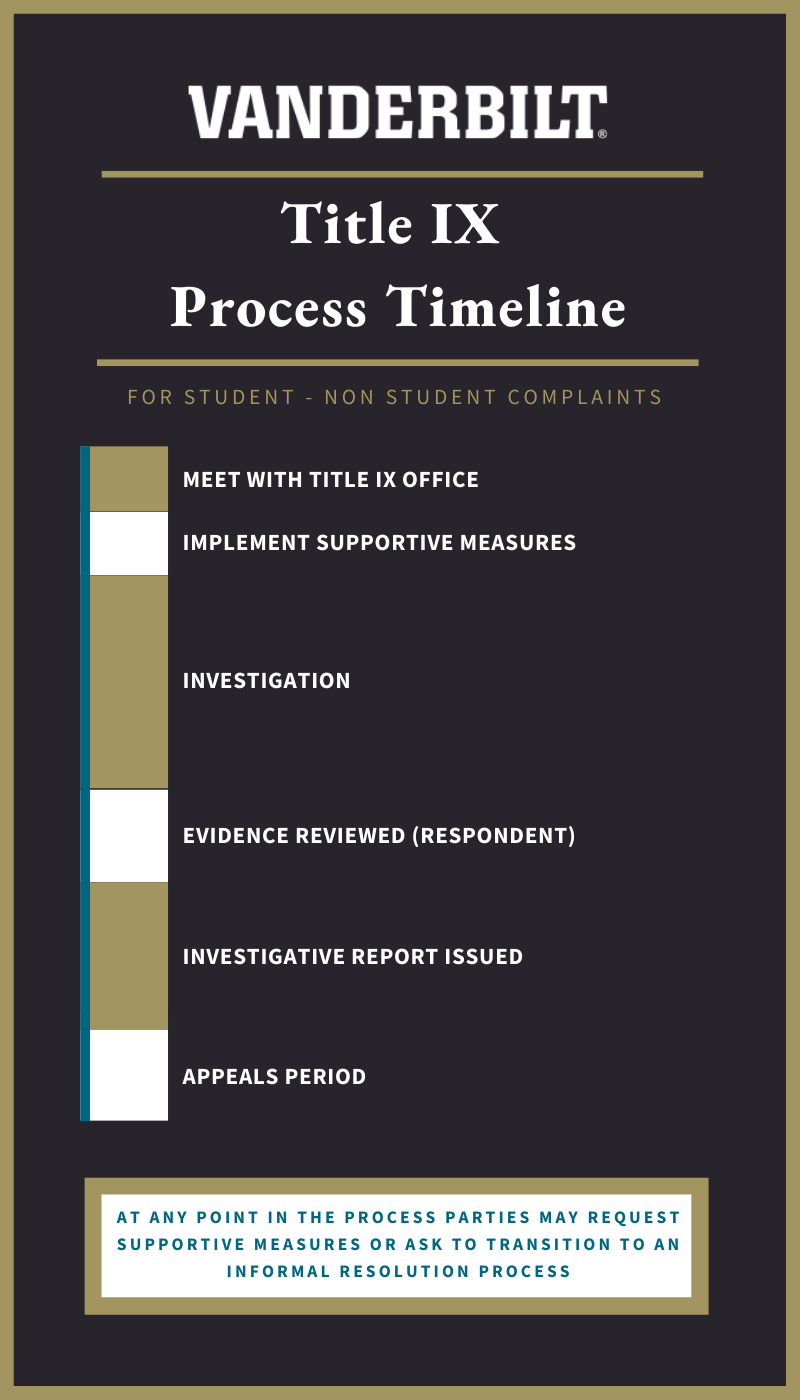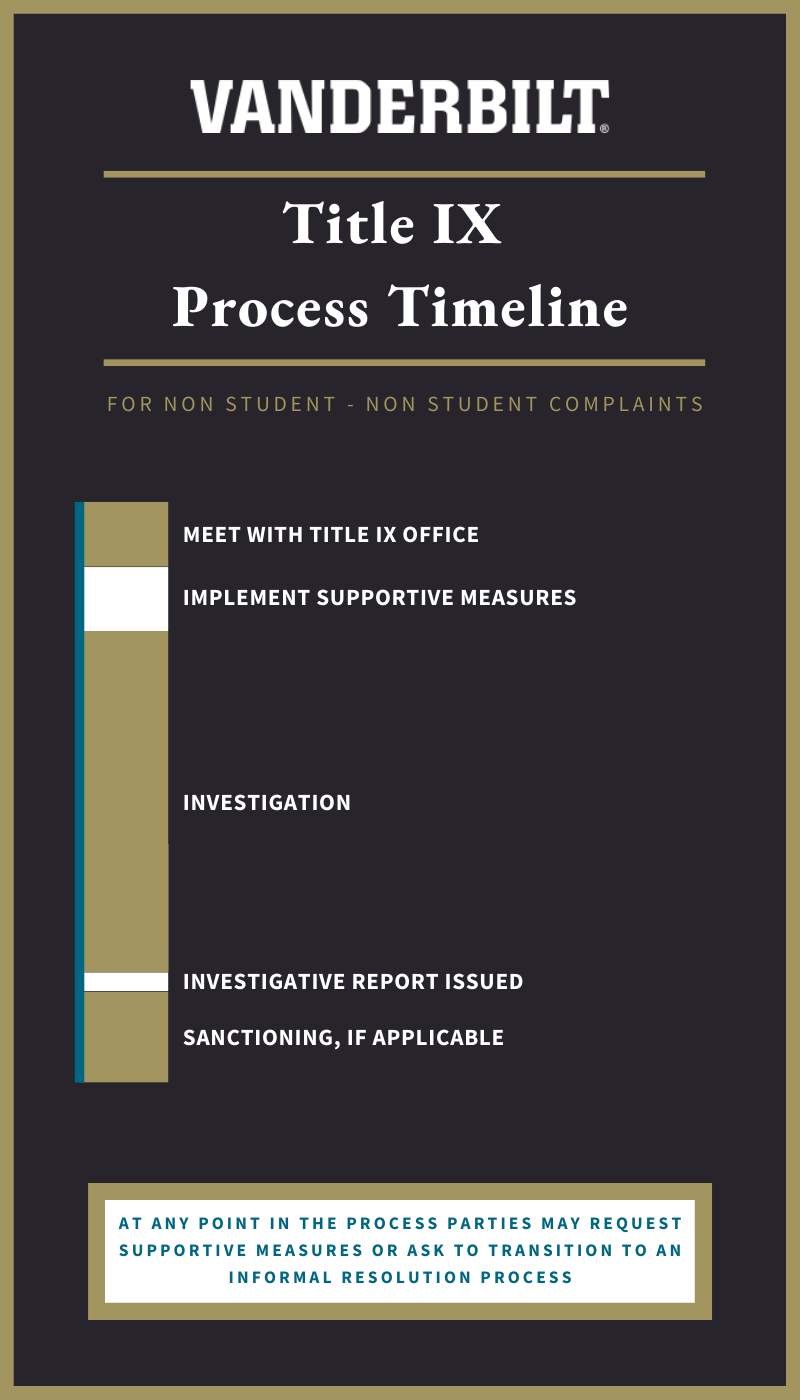Title IX Process Timelines
For all FGP cases and SMP cases with a student respondent
-
Meet with Title IX Office
- Anyone seeking to file an incident report may do so using the Incident Reporting and Accommodation Request form. Once an incident has been reported, a member of the Title IX Office will reach out to the complainant to share information about our process and any alternative means of addressing their concerns, such as the Informal Resolution Process. Typically, the Title IX Office will resolve complaints within ninety (90) business days.
-
 Implement Supportive Measures
Implement Supportive Measures
- At any point in the process, either party may request supportive measures. Supportive measures may be provided with or without the filing of a Formal Complaint. More information about supportive measures can be found on the Supportive Measures page.
-
File Formal Complaint
- If the complainant seeks to, they may file a Formal Complaint with the Title IX Office. There is no time limit on filing a Formal Complaint, it can be done at any point while the complainant is attending Vanderbilt. Filing will trigger review of the complaint under our policies. If the threshold for moving forward is met, we will issue a Notice of Allegations to the respondent and begin to investigate the complaint.
-
Investigation
- The investigation phase entails interviewing the parties (complainant and respondent(s)) and any witnesses with information directly related to the allegations. The investigator will also gather any directly related physical or digital evidence.
- Upon completion of the investigation, the investigator will draft a Preliminary Investigative Report that includes all relevant and directly related evidence that was considered. The preliminary report does not make or recommend any determination of responsibility, as that is done by the adjudicator after the hearing.
-
Preliminary Report Issued
- The parties are given a 24-hour notice before the preliminary report is issued. The preliminary report is issued only to the parties in an effort to maintain the privacy of those involved in our process.
-
Respond to Preliminary Report
- The parties have ten (10) calendar days following the issuance of the preliminary report to submit written comments and any additional evidence.
- Once the ten (10) calendar days for parties to respond to the preliminary report passes, the investigator compiles the written comments and any new relevant evidence into the final investigative report. The investigator may also conduct additional interviews with the parties or witnesses as necessary. The final report incorporates all relevant and directly related evidence. Similar to the preliminary report, the final report does not make or recommend any determination of responsibility.
-
Final Report Issued
- The parties are given a 24-hour notice before the final report is issued. The final report is issued to the parties, the parties’ advisers, and the decision-maker. The final report is issued at least ten (10) days prior to the hearing.
-
Parties Respond to Final Report
- The parties have five (5) calendar days following the issuance of the final report to submit written comments and any additional evidence.
-
Prepare for Hearing
- The parties will meet with the hearing coordinator to learn more about the hearing process. Vanderbilt will select an adviser for any parties who have not selected one prior to this point in the process. The adviser will conduct any necessary cross examination of the other party at the hearing, in addition to advising their party on the aspects of the process.
-
Hearing
- The resolution hearing is a time for both parties to present evidence and cross examine the opposing party and any witnesses. Questions are only asked by the adjudicator or the parties’ advisers. The parties themselves do not have to ask any questions of the other party or any witnesses.
-
Determination of Responsibility Issued
- Following the hearing, the adjudicator reviews all evidence and makes a determination of responsibility using the “preponderance of the evidence” standard. The adjudicator is not the same person as the investigator or Title IX Coordinator.
-
Appeals Period
- Both parties will have ten (10) calendar days following the issuance of the written determination to appeal the outcome of the hearing. The Appellate Officer is not the same person as the adjudicator, investigator, or Title IX Coordinator.
For SMP cases with student complainants and non-student respondents
1. Meet with Title IX Office
-
- Anyone seeking to file an incident report may do so using the Incident Reporting and Accommodation Request form. Once an incident has been reported, a member of the Title IX Office will reach out to the complainant to share information about our process and any alternative means of addressing their concerns, such as the informal resolution process (Link to new Informal Resolution page). Typically, the Title IX Office will resolve complaints within ninety (90) business days.
-
 Implement Supportive Measures
Implement Supportive Measures
- At any point in the process, either party may request supportive measures. Supportive measures may be provided with or without the filing of a Formal Complaint. More information about supportive measures can be found on the Supportive Measures page.
-
Investigation
- If the complainant files a formal complaint with the Title IX Office, it will trigger review of the complaint under our policies. If the threshold for moving forward is met, we will issue a Notice of Allegations to the respondent and begin to investigate the complaint. The investigation phase entails interviewing the parties (complainant and respondent(s)) and any witnesses with information directly related to the allegations. The investigator will also gather any directly related physical or digital evidence.
-
Evidence Reviewed (Respondent)
- Upon completion of the investigation, the investigator will provide the respondent with the opportunity to review the evidence gathered during the investigation. The respondent will have ten (10) days to submit written comments on the evidence.
-
Investigative Report Issued
- Once the ten (10) calendar days for the respondent to respond to evidence gathered passes, the investigator compiles the written comments and any new relevant evidence into an Investigative Report. The Investigative Report incorporates all relevant and directly related evidence considered. The Investigative Report includes the findings of the investigation and a determination as to whether the respondent violated the applicable policy. The determination of responsibility is made using the “preponderance of the evidence” standard.
- The parties are given a 24-hour notice before the Investigative Report is issued. The Title IX Coordinator will provide a report on the findings of the investigation to the Complainant and the Respondent. Complainants are informed of the outcome if the case involved allegations of sexual assault, dating or domestic violence, or stalking.
-
Appeals Period
- Both parties will have ten (10) calendar days following the issuance of the written determination to appeal the outcome of the hearing. The Appellate Officer is not the same person as the investigator or Title IX Coordinator.
For SMP cases with non-student complainants and non-student respondents
-
Meet with Title IX Office
- Anyone seeking to file an incident report may do so using the Incident Reporting and Accommodation Request form. Once an incident has been reported, a member of the Title IX Office will reach out to the complainant to share information about our process and any alternative means of addressing their concerns. Typically, the Title IX Office will resolve complaints within ninety (90) business days.
-
 Implement Supportive Measures
Implement Supportive Measures
- At any point in the process, either party may request supportive measures. Supportive measures may be provided with or without the filing of a Formal Complaint. More information about supportive measures can be found on the Supportive Measures page.
-
Investigation
- If the complainant files a formal complaint with the Title IX Office, it will trigger review of the complaint under our policies. If the threshold for moving forward is met, we will issue a Notice of Allegations to the respondent and begin to investigate the complaint. The investigation phase entails interviewing the parties (complainant and respondent(s)) and any witnesses with information directly related to the allegations. The investigator will also gather any directly related physical or digital evidence.
- Upon completion of the investigation, the investigator compiles all directly related and relevant evidence into an Investigative Report. The Investigative Report includes the findings of the investigation and a determination as to whether the respondent violated the applicable policy. The determination of responsibility is made by the investigator using the “preponderance of the evidence” standard.
-
Investigative Report Issued
- The parties are given a 24-hour notice before the Investigative Report is issued. The Title IX Coordinator will review the Investigative Report and send it to the appropriate parties based on the respondent’s relationship with Vanderbilt (faculty, staff, etc.). The Title IX Office will inform the parties of the determination of responsibility. Complainants are informed of the outcome if the case involved allegations of sexual assault, dating or domestic violence, or stalking.
-
Sanctioning, if applicable
- Any review of the findings and sanctioning will take place under the appropriate policies based on the respondent’s relationship with Vanderbilt (faculty, staff, unionized position, etc.).